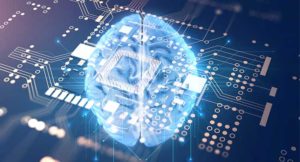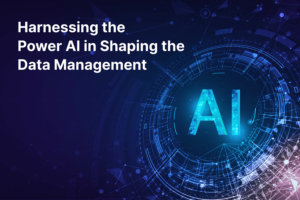AI-Powered Gaming: How Artificial Intelligence is Revolutionizing Game Development

It feels like yesterday when we were wondering about the first primitive 2D games. And today, we are in a world where 3D video games with cinematic graphics and animations have changed the overall gaming landscape. Have you ever wondered what drives this rapid transformation in the gaming industry? All thanks to Artificial Intelligence (AI)!
The impact of AI in the gaming world is transformative, redefining the industry and gaming experience. It is the driving force behind the immersive gaming experience we are enjoying today.
According to Grand View Research, the global gaming market is expected to reach $504.29 billion by 2030, growing at a CAGR of 10.2% from 2022 to 2030. And AI is the key contributor fueling this market growth.
Let’s delve deeper to understand the growing dominance of AI in the gaming world and how game app development companies are revolutionizing the industry.
Top 5 Ways AI is Transforming the Gaming World
AI has been impacting the gaming industry as far back as the 1950s. Games like Nim can be a better example, where AI allows two players to alternatively choose objects from several heaps.
However, in the early days, it used to focus on creating strategic game-playing programs, and now it is widely applied to numerous areas of game development.
For instance, in today’s technologically driven era, developers use AI to improve photorealistic effects, balance in-game complexities, generate game content, and provide ‘intelligence’ to Non-Playing Characters (NPCs).
AI can efficiently analyze the players’ behavior and preferences and adjust the game mechanics accordingly, creating more realistic game environments and providing players with more interactive experiences.
Looking for how to make a game app? Use these top 5 ways to leverage AI in game development.
Immersive Gaming Experiences
The once-imagined concept of interactive, immersive, and lifelike gaming experiences has become a tangible reality today, all thanks to AI trends. With cutting-edge AI algorithms, game developers can now design intricate virtual worlds that dynamically respond to players’ actions and choices, resulting in a distinctive and personalized gaming experience for each player.
Procedural Content Generation
Procedural Content Generation (PCG), which uses AI algorithms to build gaming content while a gamer is enjoying the game, is one of the most inventive use cases of AI in game development. This approach fosters limitless creativity. For instance, games like “No Man’s Sky” demonstrate how AI-driven PCG can create entire planets, creatures, and ecosystems. In another popular game, “Minecraft,” PCG creates a seemingly infinite universe for players to explore.
Anime Games
Anime games are gaining widespread attention these days, and AI plays a crucial role in creating these visually stunning Anime-themed games. AI in anime games helps foster authentic character interaction and enhances narrative storytelling. With realistic expressions and fluid movements, players dive into an immersive anime world and enjoy a thrilling experience right on their screen.
Personalized and Adaptive Gaming
Here comes another fascinating use case of AI in the gaming industry: predictive analytics. Gone are the days of static gaming experiences. Now, companies leverage AI and ML algorithms to introduce adaptive and personalized gameplay, where the games respond dynamically to the player’s behavior, preferences, actions, and skill level. In short, AI analyzes everything – right from players’ favored strategies to preferred gaming times.
Through predictive analysis, games can tailor storylines, challenges, rewards, etc., ensuring an engaging and personalized experience for each player. This approach not only increases engagement but also improves players’ retention rates.
Cheat Detection
Cheating has been an undesirable but unavoidable aspect of the gaming industry. This is another area where AI can help the gaming sector detect the suspicious activities of players. Advanced AI algorithms enable companies to analyze vast amounts of data and identify patterns to see abnormal activities or subtle changes in player behavior. This approach can help reduce the incidents of cheating in games, making AI a powerful deterrent against potential cheaters. For instance, games like Riot use AI to detect cheating.
The Future of AI in Game Development
The gaming industry is at the forefront of technological advancements, and AI is leading the way. AI plays an increasingly important role in redefining the gaming experiences, significantly enhancing game narratives, improving game mechanics, and creating immersive gaming experiences. From leveraging AR/VR systems that simulate real-world senses to game personalization, where every dialogue or quest is uniquely crafted for you, there is no upper limit AI can reach to revolutionize the gaming industry. As AI continues to evolve, its applications in game development seem to reach greater heights in the coming years.
Final Thoughts
AI has revolutionized game development in remarkable ways that were previously unimaginable. From generating content and enhancing visuals to adapting gameplay and analyzing player sentiments, AI is the driving force behind creating immersive and personalized gaming experiences. The future of gaming is here, and it is immersive, adaptive, and limitless.






